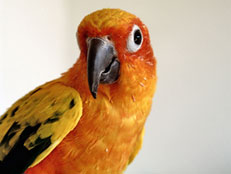
Conures generally reach sexual maturity at about 1 year, though it’s generally recommended to wait until they are 2. If breeding begins too early, the mothers can abandon or even eat their young.
Each clutch will have about 4 to 7 eggs. The incubation period lasts a little over 3 weeks. Young birds can have 2 clutches a year, sometimes 3. It is best to let breeders “rest” between clutches to guarantee the quality of the chicks. Laying eggs, and raising the hatchlings, can take a huge physical toll on them, resulting in weaker young with a lower survival rate.
You can use the nest boxes designed for cockatiels, which are about 9 inches wide, 9 inches long, and 18 inches deep. Spray the nest boxes with an anti-mite solution, then place damp, fresh peat. Cover this with a 3 to 4 inch deep layer of untreated wood shavings. You can start offering egg food to the mother soon after the eggs are laid, and then increase the amount once the hatchlings arrive. (The little ones will also enjoy millet sprays, and chickweed and dandelion, too!)
The chicks will stay in their box for about 5 weeks, before they’re ready to stay on the perch. They can only feed independently at 10 weeks. When the parents stop getting food for them, and the chicks start chasing them desperately (but are ignored) you know the weaning process has begun—it’s time to separate them from the family hutch.
It’s important, actually, to separate the chicks, since the male breeder may be interested in nesting again, and will see its own brood as a threat. Some people actually remove them when they are 3 weeks, to pave the way for hand-feeding. (Hand-fed birds are friendlier to humans, and are easier to tame.) Never get them earlier than 3 weeks, since they need mother’s milk to boost their immune system.
You can close ring the chicks when they are 2 weeks old, while the rings can still be comfortably slipped over their small feet. The close rings are useful in identifying the birds, whether as proof of being bred under a particular company, or to locate them if they are lost or stolen.